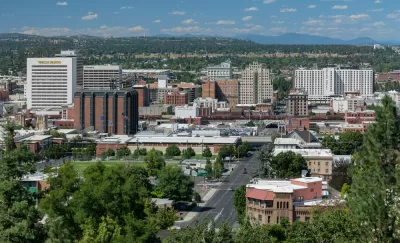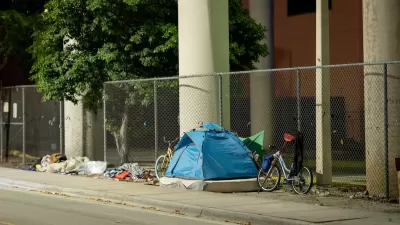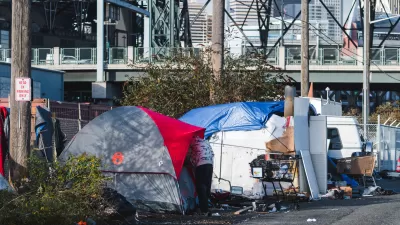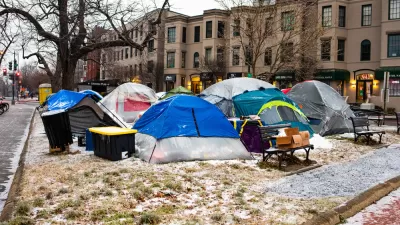With $24 million in state funding directed to Spokane’s efforts to reduce homelessness, city officials plan to relocate the over 600 residents of Camp Hope. But will services follow?

Writing for RANGE Media, Carl Segerstrom describes the uncertain future facing the residents of Camp Hope, a growing encampment located on land owned by the Washington Department of Transportation. “Covering a full city block just off of Interstate 90 a couple miles east of downtown Spokane, Camp Hope is home to more than 600 people, making it the largest encampment on state land in Washington.”
According to Segerstrom, “Service providers regularly visit the camp to connect residents with services like addiction treatment and healthcare. A dozen port-a-potties line the sidewalk and, on the day we visited, a shower trailer was available for residents to use.” As such, “The combination of on-site services and a tight-knit community has drawn people experiencing homelessness to the encampment.”
As Segerstrom writes, “What’s to come — more than $24 million in state funding and the relocation of the camp’s residents — is a testament to the endurance of the Camp Hope community and the intractability of the homelessness crisis in Spokane and across Washington.” But residents are worried about the future of their community and the options before them. “One solution that residents said they prefer over congregate shelters is pallet shelters — small, semi-permanent structures that are climate controlled and can be locked.” Segerstrom notes that “Surveys of 601 Camp Hope residents conducted by Jewels Helping Hands found that every camper would be willing to move into a pallet shelter or tiny home, and only 51 would be willing to go to a shelter, depending on the operator.”
How the funding will be used is yet to be decided by city and county officials, but there is some agreement on purchasing a hotel and renovating an existing shelter.
FULL STORY: Camp Hope residents built a community. Its future is not in their control.

Trump Administration Could Effectively End Housing Voucher Program
Federal officials are eyeing major cuts to the Section 8 program that helps millions of low-income households pay rent.

Planetizen Federal Action Tracker
A weekly monitor of how Trump’s orders and actions are impacting planners and planning in America.

Ken Jennings Launches Transit Web Series
The Jeopardy champ wants you to ride public transit.

Rebuilding Smarter: How LA County Is Guiding Fire-Ravaged Communities Toward Resilience
Los Angeles County is leading a coordinated effort to help fire-impacted communities rebuild with resilience by providing recovery resources, promoting fire-wise design, and aligning reconstruction with broader sustainability and climate goals.

When Borders Blur: Regional Collaboration in Action
As regional challenges outgrow city boundaries, “When Borders Blur” explores how cross-jurisdictional collaboration can drive smarter, more resilient urban planning, sharing real-world lessons from thriving partnerships across North America.

Philadelphia Is Expanding its Network of Roundabouts
Roundabouts are widely shown to decrease traffic speed, reduce congestion, and improve efficiency.
Urban Design for Planners 1: Software Tools
This six-course series explores essential urban design concepts using open source software and equips planners with the tools they need to participate fully in the urban design process.
Planning for Universal Design
Learn the tools for implementing Universal Design in planning regulations.
Ada County Highway District
Clanton & Associates, Inc.
Jessamine County Fiscal Court
Institute for Housing and Urban Development Studies (IHS)
City of Grandview
Harvard GSD Executive Education
Toledo-Lucas County Plan Commissions
Salt Lake City
NYU Wagner Graduate School of Public Service





























